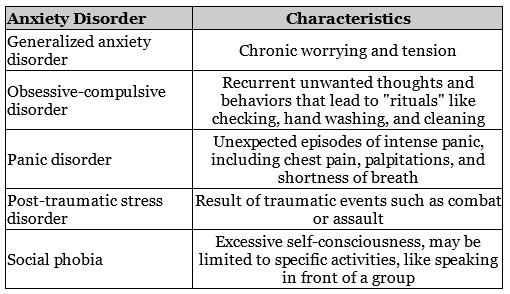Ask anyone over the age of 65 what they worry about the most as they age. You're likely to hear many say dementia, memory loss, or Alzheimer's disease.
But there's a silent mental illness that's twice as prevalent as dementia. And you're up to eight times more likely to face it than depression, which is also common in seniors.
Anxiety disorders are the most common mental illnesses in the U.S.
According to the Anxiety and Depression Association of America, 40 million adults live with anxiety. That's about 18% of our population.
Now, back in January, we wrote about anxiety as a precursor to Alzheimer's. It works in a sort of loop. As our brains change, neurotransmitters – like those responsible for moods – don't work properly. So, anxiety may occur after Alzheimer's has taken hold, or it may also signal that our brains are starting to develop Alzheimer's.
This might seem like only a conversation for older folks, as they are most at risk. In fact, about 27% of seniors have symptoms of anxiety. Doctors often misdiagnose it or miss it entirely. That's because symptoms differ from what younger people experience. For instance, seniors are more likely to have physical pain (like upset stomachs or constipation) and difficulty sleeping.
But seniors aren't the only ones at risk...
Recent studies show that anxiety earlier in life bumps up your risk for dementia years later.
We looked at a review of four papers studying about 30,000 people. It came from the University of Southampton in the U.K. It followed folks between the ages of 30 and 65 for a decade or more.
They found that people with anxiety in their mid-life had a significantly higher risk of dementia later.
This study looked at younger groups for longer periods of time. While it doesn't prove causation, researchers do believe treating anxiety earlier could help prevent dementia in the future. In other words, taking care of your mental health early will help protect your brain as you age.
If you suspect you may have anxiety, understand there are several types of anxiety disorders. Each has different characteristics. Here are the most common ones:
All anxiety disorders tend to involve similar physical symptoms. Heart palpitations, sweating, and insomnia are all ones you likely recognize. But anxiety also causes muscle tension, upset stomach, constipation, an overactive bladder, and headaches.
It's important to know that for a diagnosis, a therapist or doctor will ask you certain questions. These include which symptoms you've experienced, usually within the last two weeks. They will also ask how much these symptoms interfere with your daily life. For example, you might find a compulsion to check the oven three times every morning makes you late to work.
[optin_form id="73"]
May is National Physical Fitness and Sports Month and also Mental Health Awareness Month. What better habit to start this month than by taking care of your mental health with some healthy exercise?
One exercise most people can enjoy also reduces anxiety. Yoga typically involves physical poses, controlled breathing, and meditation. And it's a great stress reliever.
Several studies point to yoga's ability to lower stress levels in various groups. That includes pregnant women, folks with chronic illness, and those with high blood pressure.
And a Japanese study looked at both young and senior yoga students. They found that those who did yoga had decreases in something called salivary amylase activity. This is basically a measure using enzymes in your saliva to track the body's sympathetic response system. In other words, higher levels indicate the body reacting to stress. And both age groups benefited.
Yoga also protects your heart and relieves arthritis. It's my favorite, easy exercise.
If you have never done yoga before, sign up for a class. To make sure you stick with the classes, find a yoga buddy. And take advantage of studios that offer a block of yoga classes. (We recently found a studio in Baltimore offering an introductory rate of just $39 to take an unlimited number of classes in 30 days.) Making that kind of commitment makes it harder to come up with excuses to skip class.
Many gyms and yoga studios offer senior-focused practices as well. Instructors design these programs for folks over the age of 50 who may have trouble holding poses for too long or have joint or back problems. You can search for local yoga classes right here, but don't forget to check your local gyms and senior centers as well. And of course, if you have any medical concerns, check with your doctor before trying any new exercise.
What We're Reading...
- In case you missed it: Why I love yoga.
- Read the full U.K. study right here.
- Other problems that develop from untreated anxiety.
- Something different: A squeamish story not for the faint of heart.
Here's to our health, wealth, and a great retirement,
Dr. David Eifrig and the Health & Wealth Bulletin Research Team
Baltimore, Maryland
May 8, 2018

